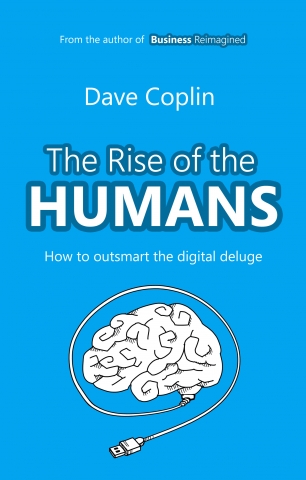|
I was midway through reading The Rise of The Humans the new book by Dave Coplin, Microsoft’s Chief Envisioning Officer, when I came across a description that was so good I immediately thought “I should tweet this”. Which would have been ironic given Coplin’s eloquent summary of what he calls “the lie of multitasking” or our increasing inability to concentrate on the task at hand without checking our many social channels. So in the spirit of his argument I stayed reading to the end of what is a charming and insightful call for reflection about what technology offers us but more importantly what we as humans need to understand to exploit it to its fullest potential. In case you are wondering what I wanted to tweet it was his description of a Big Data world as a world where n=all which I think is probably the best summation of Big Data that I have seen and one which cuts to the core of the changes in analytical approaches that many people have yet to come to grips with. According to Coplin “As our sample set approaches n=all (and our tools to understand the sample become ever more powerful), our scientific approach changes. With access to a huge amount of fact, we have to theorise less. The digital deluge will inevitably mean that the data will speak for itself. In other words ours will become a world where correlation not causality becomes king. Coplin describes himself (and his readers to some extent) as “first generation internet users and first generation big data users” and argues for the responsibility that comes with that. Too often we absent ourselves by whining about the invasive actions of companies like Facebook and Google while continuing to sleepwalk into what he describes as “Creepy Valley” a place where consumers and customers “stare at each other across the abyss, where neither is sure what information should be used and how”. He issues a timely call for us all to step up to establish new principles to protect both organisations, and ourselves so that we can extract the value of big data without doing harm. Transparency is key here, transparent companies, organisations and governments are the future and they need to be open about they do with our data and clear what we get in return.
My favorite part of Coplin’s book is when he turns to the importance of serendipity arguing that we should not confuse “the breadcrumb trail laid by recommendation engines with the material for true serendipity”. This is something that has been covered extensively by Eli Pariser in The Filter Bubble but Coplin’s recounting of the origin of the word and the need for us all to have both the powers of observation as well as wisdom when we want to really make sense of things is timely. The Rise of The Humans is a balanced look at the challenges that we all face with the speed of technology change but as befits its title it’s not written for a technology savvy audience. I give talks and training to C suite leaders on Digital Leadership and its definitely going to feature in my presentations and reading list as one of the few books I’ve seen that can be picked up by someone who knows relatively little about technology (or god forbid Big Data). One of the things I notice when I do those talks is how fearful and intimidated people can be when they feel they have fallen behind in their understanding or when they feel overwhelmed by the “digital deluge”. But Coplin is right when he suggests that nobody can any longer afford the luxury of ignorance or fear. We need to understand that the digital deluge is not a threat but a gift to society but it is how we behave as humans that will determine whether we can rise to the challenge to make it work.
2 Comments
7/31/2014 11:35:43 pm
Emer, for an alternative view to this statement:
Reply
Emer
7/31/2014 11:42:46 pm
Thanks for commenting Rob. I know what you mean but as I say in my post this is a user friendly book attempting to put across difficult ideas so perhaps necessitating some broad brush strokes at time.
Reply
Your comment will be posted after it is approved.
Leave a Reply. |
Details
Categories
All
Archives
August 2023
|


 RSS Feed
RSS Feed